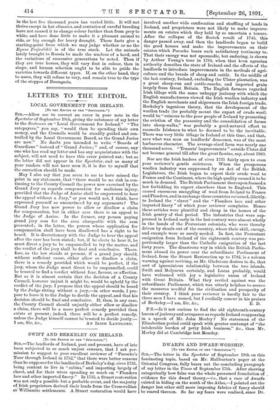LETTERS TO THE EDITOR.
LOCAL GOVERNMENT FOR IRELAND.
[To THE EDITOR OF THE "SPECTATOR."]
Sia,—Allow me to correct an error in your note in the Spectator of September 19th, giving the substance of my letter to the Scotsman on " Local Government for Ireland." " The ratepayers," you say, " would then be spending their own money, and the Councils would be steadily guided and con- trolled by the Local Government Board, as the Grand Juries are now." No doubt you intended to write " Boards of Guardians " instead of " Grand Juries ; " and, of course, any one who has read my letter and has any acquaintance with the subject, will not need to have this error pointed out; but as the letter did not appear in the Spectator, and as many of your readers will not have seen it, it is due to myself that the correction should be made.
May I also say that you seem to me to have missed the point in my statement, that "there would be no risk in con- tinuing to the County Council the power now exercised by the Grand Jury as regards compensation for malicious injury, provided that the Judge of Assize shall be empowered to hear the appeal without a Jury," or you would not, I think, have expressed yourself as unconvinced by my arguments P The Grand Jury has now power to allow or disallow a claim for compensation, but in either case there is an appeal to the Judge of Assize. In the former, any person paying grand jury cess for the area chargeable with the .sum presented ; in the latter, the person whose application for compensation shall have been disallowed has a right to be heard. It is discretionary with the Judge to hear the appeal after the case has been stated; but, if he elects to hear it, he must direct a jury to be empannelled to try the matter, and the verdict of the jury shall be final and conclusive. There- fore, as the law. stands at present, if a grand jury should, without sufficient cause, either allow or disallow a claim, there is a remedy provided which would be perfect, if the jury, whom the Judge must direct to be empannelled, could be trusted to find a verdict without fear, favour, or affection. But as it is almost certain that the decision of a County Council, however unjust it might be, would be upheld by the verdict of the jury, I propose that the appeal should be heard by the Judge sitting without a jury,—in other words, I pro- pose to leave it to the Judge to decide the appeal, and that his decision sh-ould be final and conclusive. If, then, in any case, the County Council should unjustly either allow or disallow a claim, there will be a more perfect remedy provided than exists at present ; indeed, there will be a perfect remedy, unless the Judge himself cannot be-trusted to decide justly.—


































 Previous page
Previous page